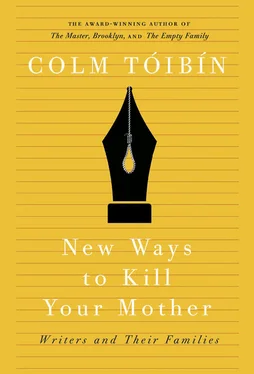Baldwin the best-seller in 1962 wanted to have it both ways. This need was first of all a way of unloosening him from any easy categories, but it was also central to his procedures as an artist that he carried in his temperament a sense of James’s interest in consciousness as something glittering and also as something hidden and secretive, a concern with language as both mask and pure revelation. But Baldwin also had a fascination with eloquence itself, the soaring phrase, the rhythm pushed hard, the sharp and glorious ring of a sentence. The list of what had made him such an interesting stylist would be long. Over the years he would vary its ingredients. Sometimes, he would do so to distract the reader from his own artistry and sophistication; other times, he would do so because he liked the list for its sound and variation, as in the list he provided in Notes of a Native Son : ‘The King James Bible, the rhetoric of the store-front church, something ironic and violent and perpetually understated in Negro speech — and something of Dickens’s love for bravura.’ But the style itself did not come simply; it could not be easily defined because it varied and shifted. It had real bravura moments, like a set of famous riffs, or an encore, such as this passage in part 1 of Another Country when Rufus and Vivaldo arrive at Benno’s Bar in the Village:
The bar was terribly crowded. Advertising men were there, drinking double shots of bourbon or vodka, on the rocks; college boys were there, their wet fingers slippery on the beer bottles; lone men stood near the doors or in the corners watching the drifting women. The college boys, gleaming with ignorance and mad with chastity, made terrified efforts to attract the feminine attention, but succeeded only in attracting each other. Some of the men were buying drinks for some of the women — who wandered incessantly from the juke box to the bar — and they faced each other over smiles which were pitched, with an eerie precision, between longing and contempt. Black-and-white couples were together here — closer together now than they would be later, when they got home. These several histories were camouflaged in the jargon which, wave upon wave, rolled through the bar; were locked in a silence like the silence of glaciers. Only the juke box spoke, grinding out each evening, all evening long, syncopated synthetic laments for love.
It is easy to sense in this passage the rhythms of jazz, but also of the prose writers of an earlier generation, the Fitzgerald of The Great Gatsby , the Hemingway of The Sun Also Rises . Baldwin was not afraid of repetition (‘some of the men were buying drinks for some of the women’), or setting up patterns of beat and sound (note the constant use of ‘were’), or using punctuation with care and control (note the comma before ‘when they got home’; note the semicolon after ‘rolled through the bar’), and then striking home with a phrase or an observation utterly surprising, and full of delight (note ‘gleaming with ignorance and mad with chastity’ or ‘pitched, with an eerie precision, between longing and contempt’).
While Baldwin was in full possession of this bravura tone, he was also able to write quiet and effective and emotionally charged sentences. The sixty-one words in the opening paragraph of Go Tell It on the Mountain have only one word — the first — with more than three syllables and forty-one words with only one syllable.
Everyone had always said that John would be a preacher when he grew up, just like his father. It had been said so often that John, without ever thinking about it, had come to believe it himself. Not until the morning of his fourteenth birthday did he really begin to think about it, and by then it was already too late.
This style seems closer to Hemingway than to jazz or James; it suggests that Baldwin was as comfortable with the tradition he inherited from a generation of writers most of whom were at the height of their fame as he was starting to write. No young writers ever wish to give too much credit to the writers who could have been their father. They prefer to pay homage to grandfathers or to painters or musicians or ballet dancers or acrobats. It is one way of killing your father, to pretend that he made no difference to you while watching his cadences like a hawk.
So, too, in Baldwin’s short stories this plain opening style had not an ounce of James or of jazz. ‘The Rockpile’ opens: ‘Across the street from their house, in an empty lot between two houses, stood the rockpile.’ ‘The Outing’ opens: ‘Each summer the church gave an outing.’ ‘Sonny’s Blues’ opens: ‘I read about it in the paper, in the subway, on my way to work.’
Between the publication of Go Tell It on the Mountain in 1953 and the volume of stories Going to Meet the Man in 1965, Baldwin wrote a piece for The New York Times that set about openly killing some of his literary fathers. In January 1962 he wrote:
Since World War II, certain names in recent American literature — Hemingway, Fitzgerald, Dos Passos, Faulkner — have acquired such weight and become so sacrosanct that they have been used as touchstones to reveal the understandable, but lamentable, inadequacy of the younger literary artists… Let one of us, the younger, attempt to create a restless, unhappy, free-wheeling heroine and we are immediately informed that Hemingway or Fitzgerald did the same thing better — infinitely better.
Having made clear, in grudging tone, his immense respect for these writers, Baldwin proceeded to demolish them.
It is useful… to remember in the case of Hemingway that his reputation began to be unassailable at the very instant that his work began that decline from which it never recovered — at about the time of For Whom the Bell Tolls . Hindsight allows us to say that this boyish and romantic and inflated book marks Hemingway’s abdication from the efforts to understand the many-sided evil that is in the world. This is exactly the same thing as saying that he somehow gave up the effort to become a great novelist.
Having also demolished Faulkner (‘such indefensibly muddy work as “Intruder in the Dust” or “Requiem for a Nun”‘) and ‘the later development’ of Dos Passos (‘if one can call it that’) and Fitzgerald (‘there is no longer anything to say about Fitzgerald’), Baldwin considered the matter of America itself as a realm of failed imaginations.
The previously mentioned giants have at least one thing in common: their simplicity… It is the American way of looking on the world as a place to be corrected, and in which innocence is inexplicably lost. It is this almost inexpressible pain which lends such force to some of the early Hemingway stories — including ‘The Killers’ — and to the marvelous fishing sequence in ‘The Sun Also Rises’; and it is also the reason that Hemingway’s heroines seem so peculiarly sexless and manufactured.
Baldwin, in his attempt to establish a context for his own work, now invoked the spirit of Henry James by taking the unusual step of claiming James as a novelist who dealt with the matter of failed masculinity in America. In The Ambassadors , Baldwin wrote,
What is the moral dilemma of Lambert Strether if not that, at the midnight hour, he realizes that he has, somehow, failed his manhood: that the ‘masculine sensibility’ as James puts it, has failed in him?… Strether’s triumph is that he is able to realize this, even though he knows it is too late for him to act on it. And it is James’ perception of this peculiar impossibility which makes him, until today, the greatest of our novelists. For the question which he raised, ricocheting it, so to speak, off the backs of his heroines, is the question which so torments us now. The question is this: How is an American to become a man? And this is precisely the same thing as asking: How is America to become a nation? By contrast with him, the giants who came to the fore between the two world wars merely lamented the necessity.
Читать дальше












